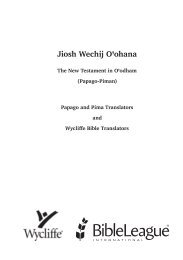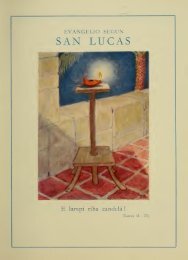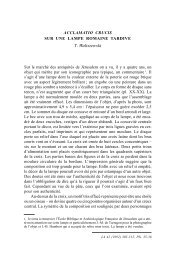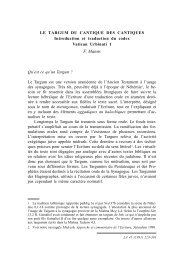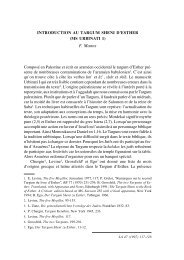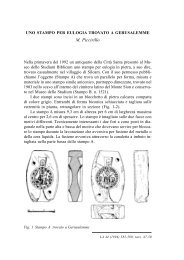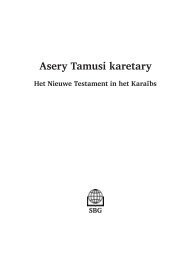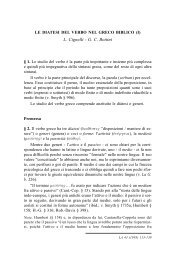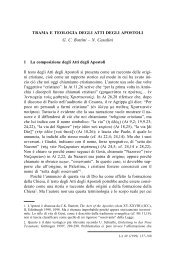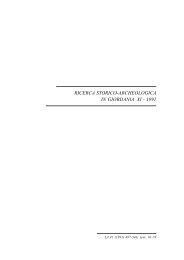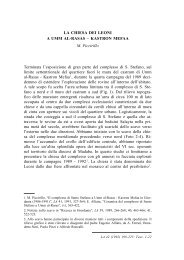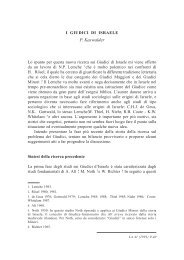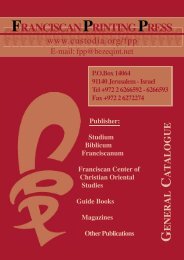Literary Criticism and Theology of P - Christus Rex
Literary Criticism and Theology of P - Christus Rex
Literary Criticism and Theology of P - Christus Rex
You also want an ePaper? Increase the reach of your titles
YUMPU automatically turns print PDFs into web optimized ePapers that Google loves.
30<br />
E. CORTESE<br />
instance, the knowledge <strong>of</strong> the intrinsic corruption <strong>of</strong> man <strong>and</strong> the failure <strong>of</strong><br />
the covenant, which the Jews will not grasp, is underst<strong>and</strong>able, if we admit<br />
this dating <strong>of</strong> H (<strong>and</strong> P) <strong>and</strong> if we take it in the context <strong>of</strong> the exiles, who felt<br />
themselves punished for their sins <strong>and</strong> for the sins <strong>of</strong> their fathers.<br />
Conclusion. Coming to the problem <strong>of</strong> berît in Lev 26, we should now be<br />
in a position to solve it. There is no berît at Sinai in P because the background<br />
is the exile, <strong>and</strong> no ceremony <strong>of</strong> covenant was possible there. Moreover, the<br />
meditations <strong>of</strong> H, following the scheme <strong>of</strong> the Dtr Code, were originally set<br />
at the border <strong>of</strong> the l<strong>and</strong>. Therefore P excludes the covenant from the Sinai<br />
event. On the other side P is conscious <strong>of</strong> the human inability in carrying out<br />
the covenant obligations, as its tragic experience teaches, but it does not<br />
consider this failure as a desperate consequence. Similarly it does not emphasize<br />
the covenant as a mutual obligation, but rather prefers to emphasize<br />
the gracious aspect <strong>of</strong> the covenant from the part <strong>of</strong> God; therefore P mentions<br />
the berît in the Noah <strong>and</strong> Abraham narratives <strong>and</strong> in the calling <strong>of</strong> Moses. This<br />
however does not mean that P is skeptical about the observance <strong>of</strong> the law,<br />
because it places especially at Sinai an enormous quantity <strong>of</strong> laws. Anyhow<br />
we must distinguish the law from the covenant on the law. As for the law, Pg<br />
has its nucleus on the ark, remembering that it is fundamentally from God <strong>and</strong><br />
from His gracious presence that the moral obligations arise <strong>and</strong> that men<br />
receive the force to observe the comm<strong>and</strong>ments.<br />
The recurring <strong>of</strong> the covenant theme, then, does not surprise us, both in<br />
the sense <strong>of</strong> a mutual covenant, in the first part <strong>of</strong> Lev 26, <strong>and</strong> in the sense <strong>of</strong><br />
gracious promise, in the second part. It is not necessary to turn to hypotheses<br />
<strong>of</strong> different redactions or even <strong>of</strong> different documents, P <strong>and</strong> H, mixed here<br />
in any way. Korpel defends a poetical structure <strong>and</strong> a unitary composition <strong>of</strong><br />
all Lev 26 64 , <strong>and</strong> we can now regard Lev 26 as a unitary text, without being<br />
disturbed by literary or theological prejudices.<br />
Enzo Cortese<br />
Pr<strong>of</strong>essore invitato<br />
Studium Biblicum Franciscanum, Jerusalem<br />
64. M.C.A. Korpel, “The Epilogue <strong>of</strong> the Holyness Code”, in J.C. de Moor - G.E. Watson<br />
(Eds.), Verse in NE Prose (AOAT 42), Neukirchen 1993, 123-150.



